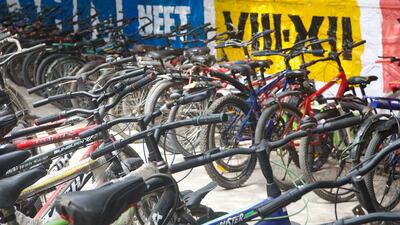The Indian city of Kota is known as the country's “coaching factory” due to its numerous education institutions that prepare would-be doctors and engineers for their entrance exams.
But in recent years it has gained a new reputation, as the premium "cycling city" in a country where riding a bike can be difficult or even dangerous.
Kota's large student population has spurred a growth in the number of bicycles in the city.
The city in India’s western desert state of Rajasthan draws about 200,000 pupils every year from across the country, as young people between the ages of 14 and 21 prepare for their national qualification tests to enter premier engineering or medical institutions.
The students come from diverse economic and social backgrounds but have adopted the humble bicycle as their main mode of transport.
“Youngsters enjoy cycling but here it is both a necessity as it is pocket-friendly and convenient, so you’ll see most of the students riding. All my friends ride a bicycle, it is fun to ride it in a group,” Aditya Singh, a student, told The National.
Whether going to their coaching institute, returning to accommodation or going to eat out, students are almost always seen riding bicycles – a rare sight in the country where the popularity of the bicycle has declined significantly.
There are no official statistics on the exact number of bicycles in Kota, but media reports estimate 50,000 people cycle every day, of which at least 30,000 are thought to be students, in a city with a population of 1.5 million.
Growing cycling community
The popularity of cycling in Kota stands out against the rest of India, where the car reigns supreme.
Cycling as a means of transport is uncommon in most of India due to lack safety and infrastructure, and because of the hot weather.
Bicycles were commonly used in the early 1900s, having been brought in by the British.
In 1910, about 35,000 bicycles were imported to India, according to historian David Arnold.
However, the popularity of cycling dropped over time, as scooters and motorbikes and later cars were introduced and more buses hit the roads.
Now, the South Asian nation is one of the countries with the busiest roads in the world but lacks cycling infrastructure.
There are more than 300 million registered vehicles. Although many Indians cannot afford cars, roads are often full of motorbikes, scooters, tuk-tuks, buses, trucks and pedal-rickshaws.
Crashes are frequent, with more than 412,000 road accidents reported in India in 2021, government figures show.
There is little dedicated cycling infrastructure and most roads are congested and polluted.

In Kota, however, the scene is different.
Students prefer cycling as it is convenient and cheap. Despite the absence of a cycling track, they feel safer to ride as traffic is slow and almost every fifth person is estimated to ride a bicycle.
“We have to cover a short distance so it is convenient for us. I have a motorbike at home but here, I feel good to ride a bicycle. It is also good for health and good for the environment,” Vicky Chauhan, another student, said.
“Youngsters enjoy cycling and public transport could be expensive. Also, because most of the people ride bicycles here, it feels safe on the road."
The growing cycling community in the city that is spread across 300 square kilometres has also given rise to the demand for dealers who sell bicycles for between 4,000-15,000 rupees ($48-$180).
Kota also has the second-largest second-hand bicycle market in the country, shop owners claim, with sales of 100,000 annually.
“Because of the cycling culture, there is a huge demand for bicycles. It is beneficial for exercise purposes and also they can sell it back to us for half the price when they leave the city,” Hemant Chhabariya, owner of Chhabariya Cycle Concept, told The National.
“Kota has the second biggest second-hand cycle market in the country. We sell more than 100,000-125,000 second-hand cycles every year. We have recently sold 500 cycles to students of an engineering institute."

Contributing to a greener environment
It is not only students who have taken to bicycles, with various groups formed throughout the city that aim to encourage cycling for a clean environment.
India suffers from the scourge of air pollution all year round and is home to 39 out of 50 most polluted cities in the world.
Experts have blamed vehicle emissions as a contributing factor to the toxic air quality, along with fuel adulteration and smoke from farm fires.
Delhi has been experiencing high levels of toxic air levels since October, with the Air Quality Index reaching hazardous or severe levels, forcing the government to pitch for a vehicle rationing system, but in Kota, the AQI has remained at moderate levels.
Cyclists give credit for the cleaner atmosphere to the use of bicycles.

founder of Cyclotrots in Kota
Chandresh Dutt Sharma, founder of Cyclotrots, a bicycle community with 4,000 members in Kota, is one of them.
“We started the group in 2011 with an aim to eliminate pollution and reduce carbon emission and give back to mother earth. We were two or three friends then but now more people, including teachers at coaching centres and other professionals have joined us,” Mr Sharma, 53, told The National.
“We organise seminars and workshops in schools and coaching institutions to motivate them to cycle more. While students prefer cycles for shorter distances, we organise events for fitness and train for competitions.
“Cycling keeps the environment clean and humans fit.”












